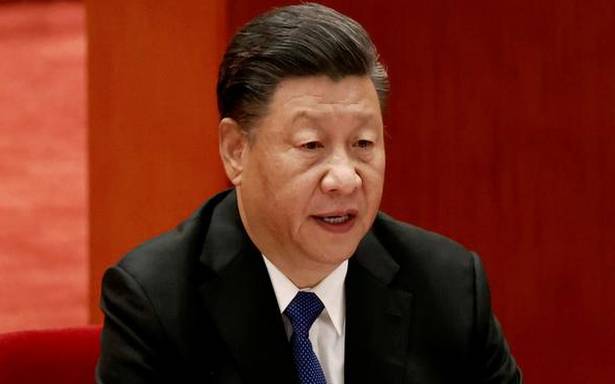The 20th Party Congress to be held in October next year will likely see him begin his third five-year term.
A major four-day Communist Party conclave that will open in Beijing on Monday is expected to further tighten President and General Secretary Xi Jinping’s grip over China’s ruling party and enshrine his place in the party’s official history.
Mr. Xi, who took over in 2012, has already abolished term limits and ended the collective leadership model. The 20th Party Congress to be held in October next year will likely see him begin his third five-year term.
Monday’s behind-closed doors meet, called the sixth plenum, is an annual gathering of the 370 members of the party’s Central Committee. Seven such meetings are held during the five year period between each Party Congress. The sixth plenum has traditionally occupied particular significance as it focuses on party ideology. At the last sixth plenum five years ago, Mr. Xi was declared the “core” of the party, formalising the disbanding of the collective leadership model that had been place for more than two decades.
This plenum could be even more significant, reports in the Chinese press have said, noting that the party will pass what is called a “historic resolution”. This would be only the third in its 100-year history, with the first passed by Mao Zedong in 1945, signifying a turn away from Stalin’s ideological influence towards what is called “Mao Zedong Thought” as a leading ideology for the party.
The second resolution in 1981, passed by Deng Xiaoping, marked the end of the Mao era, turned the page over the disasters of the Cultural Revolution and the excesses of Maoism, and launched what is called the “reform and opening up” era.
The party media has said Mr. Xi’s ascension has marked the start of a third “new era”, and a transition from “growing rich” under Deng to “growing strong” under Mr. Xi, a theme that the plenum may emphasise.
The party sees this “new era” as reflecting China’s growing prosperity, strength, and global clout, while Mr. Xi’s detractors see an era that is being marked by a shrinking space for dissent amid centralisation of power at home, coupled with more assertive behaviour abroad, with rising tensions from Taiwan to India and the South China Sea.
Another theme that may find mention is what Mr. Xi has called a push for “common prosperity”. Under a broad range of measures enforced by regulators over the past year, the government has sought to curb the growing influence of big private firms, especially in the tech sector, warned of curbing “excessive incomes” and increasing taxes on the wealthy, and placed curbs on a booming private education industry and on the real estate sector in an effort to address the wealth gap.
The broader goal of the plenum may be to cement Mr. Xi’s place in party history, and establish him as the party’s tallest leader, certainly since Deng and perhaps even on par with Mao. This would also pave the way for Mr. Xi, who is 68, to appoint his favoured candidates in top positions as part of next year’s leadership change when many senior officials, including second-ranked Premier Li Keqiang, will retire.
This weekend, the official Xinhua news agency published a lengthy profile of Mr. Xi that was carried across many newspapers in China, appearing to lay the groundwork for a major announcement in the coming week.
“A landmark document will be tabled at this important meeting – the resolution on the major achievements and historical experience of the CPC’s 100 years of endeavours,” the report said, adding that “since being elected general secretary of the CPC Central Committee in November 2012, Xi has been seen as a man of determination and action, a man of profound thoughts and feelings, a man who inherited a legacy but dares to innovate, and a man who has forward-looking vision and is committed to working tirelessly.”
“Under his leadership, China is becoming a powerful country, and is now entering an era of strength,” it said, adding that “without a strong leadership core, the CPC would find it hard to unify the entire Party’s will or build solidarity and unity among people of all ethnic groups.”
On Friday, ahead of the meet, Mr. Xi conferred honours on “national ethical role models” selected by the party from different walks of life. Among those he met was Qi Fabao, the PLA regiment commander involved in the June 2020 Galwan Valley clash. The commander and four PLA soldiers who died in the clash, in which 20 Indian soldiers lost their lives, were among those nominated as “the country’s ethical role models”.
Source: Read Full Article

